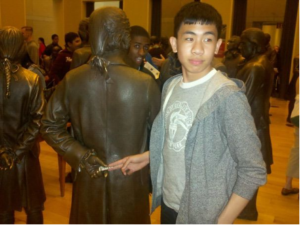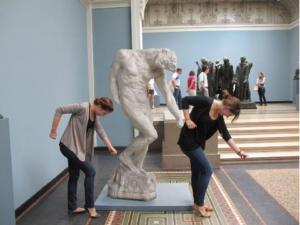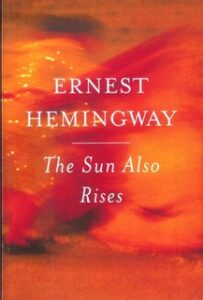For your enjoyment (sent in by JM)…
People Who Know How to Pose with Sculpture






For your enjoyment (sent in by JM)…
People Who Know How to Pose with Sculpture






Comedy Censorship: The Penultimate Step Before Totalitarianism

Over the last 10 years or so, ideas about fairness and equality have changed drastically in Europe and America. Almost all of it germinated in colleges and universities. And most of it mind-bogglingly stupid. When I hear about it, I feel afraid for my grandchildren. What kind of Orwellian world will they have to live in?
I tell myself to calm down. Not to worry. These new ideas are so contrary to the actual experience of living in the real world, that they can’t possibly last much longer. But if they do last, what then?
For someone like me, someone who is not comfortable doing and thinking what I’m told, the thought of a world where my grandkids are deprived of not just freedom of speech, but freedom of thought… that scares me.
And it’s not like it can’t happen. It has. And it has always preceded totalitarianism. Because there is nothing more effective in establishing control over a population than establishing laws that restrict speech.
The best way to do that is to convince the population that certain types of speech should be illegal. So, they begin with the most offensive forms of speech and move outward from there. First, they outlaw racist, antireligious, and xenophobic speech. Then sexist and homophobic speech. Then any speech that is dubbed “hateful,” including anything that might be offensive to fat people, to short people, to sick and disabled people, and – what we see happening now – even to pedophiles.
The final hurdle in controlling speech and thereby controlling thought is to regulate humor.
Humor has always been the refuge for speech that would otherwise be politically and socially unacceptable. That’s because political and social humor has a message that totalitarians cannot abide. The message is: Relax. Stop fuming. None of us is perfect. All of us are flawed. Our flaws are human. They unite us. Let’s poke fun at our differences and, by doing so, recognize our common humanity.
In Europe and in America, the totalitarians have made good progress in recent years in their campaign against humor. Click here and here.
And here’s a way for you to judge for yourself: Could any of these very funny bits have been included in The Office if it were produced today?
“Without freedom of thought, there can be no such thing as wisdom – and no such thing as public liberty without freedom of speech.” – Benjamin Franklin
How Far Did He Go?

The Sam Bankman-Fried story keeps getting bigger. On Tuesday, I made the point that the mainstream media has been either sympathetic to or suspiciously quiet about this multibillion-dollar scammer. He was arrested on the eve of having to testify before Congress. (That, itself, is very interesting.) But since he was arrested and charged with fraud, his strategy of promoting himself as a good kid with good intentions that made a few “dumb” mistakes – that’s not going to fly. And so, more incriminating stories are being reported on almost daily.
The most recent: SBF secretly funded crypto news site The Block and its CEO’s Bahamas apartment.
Read about it here.
Cathie Woods vs. Warren Buffett

Cathie Woods (of Ark Investing) is a crypto/disruptive technology investment superstar. She attracts the young, hip, and adventurous. The Hustle recently published a short article on her track record over the past five years compared to Wall Street’s favorite investor.
See who’s done better here.

The Sun Also Rises
By Ernest Hemingway
Originally published 1926
272 pages
This was Hemingway’s first novel. And I think it’s a very good one.
Plot
It’s the story of a small group of 20-something British and American expats traveling from Paris to Pamplona several years after WWI. Jake, the main character, is a writer, an outdoorsman, a bullfighting aficionado, a heavy drinker, a war veteran, and a romantic. (Who does that sound like?) He’s in love with Lady Brett Ashley, with whom just about every other character in the novel is in love with. Jake has certain advantages in this contest, as Brett is attracted to manly men. But he has one significant disadvantage: He’s been rendered impotent (or so it seems) from a war wound. Thus, Jake spends most of the story in her periphery, watching her have affairs with acquaintances and friends.
If you know anything about Hemingway, it will be difficult to read this without seeing it as a roman à clef. You’ll want to guess who the other characters are modeled on. (And there’s plenty of research to read about that.) It will also make you wonder if the speculations about Hemingway’s sexual preferences might be true.
But it’s more than a roman à clef. It’s also a travelog, a period piece, and a portrait of the artist as a young man. Which could have been a bit of biting off more than this young writer was able to chew. But it manages to do that and more. It’s also about finding meaning in one’s life after the innocence of youth has been eradicated by experience.
Theme
That bit I just mentioned about the loss of innocence and the search for meaning has been characterized by some critics as the emblematic chronicle of what Gertrude Stein called “The Lost Generation” – the rejection by the writers and artists who fought in WWI of traditional European and American values and their struggle to feel comfortable reinstalling themselves in the quotidian lives of their fellow countrymen that were protected from the horrors of that war.
Critical Reception
The Sun Also Rises received mixed reviews when it was first published. One of the problems some critics had with it was that although the story was tragic, the protagonist wasn’t heroic. And the ending was neither triumphant nor tragic. (This was beautifully captured at the end of the novel when Brett says to Jake that had things been different, they could have had “a damned good time together.” Jake’s response, the last line of the novel: “Wouldn’t it be pretty to think so?”)
Critics no longer feel that way. In fact, it could be argued that The Sun Also Rises led the way for what some call the modern tragedy.
Another problem some critics had with it was Hemingway’s literary style – the understatement, the pared down sentimentality, the presentation of images and scenes without explanations. Like the treatment of the story, Hemingway’s writing style (most of which he was tutored in by Gertrude Stein and Ezra Pound) became the literary standard of American prose.
Today, The Sun also Rises is regarded as one of Hemingway’s best books, and one of the best American novels ever written.
Everything is more expensive this Christmas – even a partridge in a pear tree! Click here for the alarming details.
And click here for the extra cost of putting up holiday lights this year, state by state.
I don’t know if this letter was written in earnest. But I do know, from Letters of Note, that it is real.
Margaret Stuart-Wortley
1879
Margaret,
If you find yourself unwilling to accept me, will you please pass this letter on to your sister Caroline?
Cordially,
Ralph King-Milbanke, 2nd Earl of Lovelace
Pygmy Date Palms
Binomial name: Phoenix roebelenii

These are Pygmy Date Palms, showing their roots and looking scary. They look like this because they were originally in plastic pots that were left unattended for years before we bought this parcel of property where they are now located. The roots had grown through the holes in the bottom of the pots and eventually broke through and grew out of them. When I first saw them, I thought it would be fun to make a “scary forest” with them for young children. And that’s what we did. We put a yellow-brick road between them and created the forest. After that, we added a playground and a several small houses and a railroad station, and more.
Here is a photo of what it looks like now.

Re Alex Hormozi’s recommendation of Ready, Fire, Aim in Tuesday’s issue:
“Ready, Fire, Aim is amazing.” – JC
“It is one of the best, and I reread it about once per year.” – CH
“It’s your crowning achievement. Insights on every page!” – MS
Another mention from Alex Hormozi – this one for “The Rule of One”…